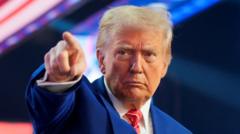The article text:
At a recent Turning Point USA conference, President-elect Donald Trump took a bold stance regarding the Panama Canal, demanding that Panama lower shipping fees or face a push for the canal's return to US sovereignty. Speaking to a gathering of conservative supporters in Arizona, he labeled the fees as "ridiculous" and accused Panama of overcharging American shipping and naval vessels. Trump asserted, “This complete rip-off of our country will immediately stop,” signaling his potential approach to foreign relations once he assumes office.
His statements were swiftly challenged by Panama’s President José Raúl Mulino, who responded that the canal and its surrounding areas are undeniably under Panamanian control. Mulino reaffirmed the nation's sovereignty, asserting that there would be no negotiations regarding their ownership of the canal. This interaction reflects a potential shift in US foreign policy, marking a rare instance of a leader demanding territorial control from another country without a clear strategy for implementation.
Trump's remarks also connected to broader themes in his political rhetoric about America's trade relationships, where he has frequently targeted Canada and Mexico alongside Panama. He suggested that if shipping rates remained high, the US would demand the canal's return "in full, quickly and without question." Built in the early 1900s, the canal initially remained under US control until gradual handover agreements culminated in 1999, which have shaped diplomatic relations ever since.
Alongside his proposals for the canal, he reiterated familiar campaign themes, touching on immigration, crime, and trade practices he deems unfavorable. The speech came shortly after Congress passed a deal to keep the government open, a topic he notably avoided. Instead, Trump recounted his campaign success and referenced prominent personalities, including dismissing claims that Elon Musk was set to take over the presidency, emphasizing, “That’s not happening.”
Despite the crowd’s enthusiasm, divisions within the Republican party regarding spending and governance remained relatively muted at the conference, illustrating an ongoing complexity in the party's internal dynamics as Trump's presidency approaches. The future of US-Panama relations may hinge on Trump's policy decisions in the coming months, leaving many to ponder the implications of such provocative claims on international diplomacy.
At a recent Turning Point USA conference, President-elect Donald Trump took a bold stance regarding the Panama Canal, demanding that Panama lower shipping fees or face a push for the canal's return to US sovereignty. Speaking to a gathering of conservative supporters in Arizona, he labeled the fees as "ridiculous" and accused Panama of overcharging American shipping and naval vessels. Trump asserted, “This complete rip-off of our country will immediately stop,” signaling his potential approach to foreign relations once he assumes office.
His statements were swiftly challenged by Panama’s President José Raúl Mulino, who responded that the canal and its surrounding areas are undeniably under Panamanian control. Mulino reaffirmed the nation's sovereignty, asserting that there would be no negotiations regarding their ownership of the canal. This interaction reflects a potential shift in US foreign policy, marking a rare instance of a leader demanding territorial control from another country without a clear strategy for implementation.
Trump's remarks also connected to broader themes in his political rhetoric about America's trade relationships, where he has frequently targeted Canada and Mexico alongside Panama. He suggested that if shipping rates remained high, the US would demand the canal's return "in full, quickly and without question." Built in the early 1900s, the canal initially remained under US control until gradual handover agreements culminated in 1999, which have shaped diplomatic relations ever since.
Alongside his proposals for the canal, he reiterated familiar campaign themes, touching on immigration, crime, and trade practices he deems unfavorable. The speech came shortly after Congress passed a deal to keep the government open, a topic he notably avoided. Instead, Trump recounted his campaign success and referenced prominent personalities, including dismissing claims that Elon Musk was set to take over the presidency, emphasizing, “That’s not happening.”
Despite the crowd’s enthusiasm, divisions within the Republican party regarding spending and governance remained relatively muted at the conference, illustrating an ongoing complexity in the party's internal dynamics as Trump's presidency approaches. The future of US-Panama relations may hinge on Trump's policy decisions in the coming months, leaving many to ponder the implications of such provocative claims on international diplomacy.





















